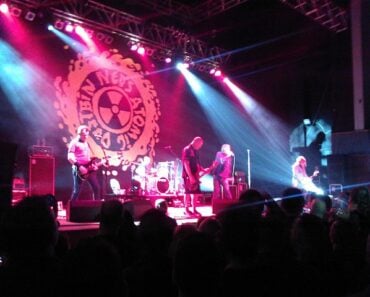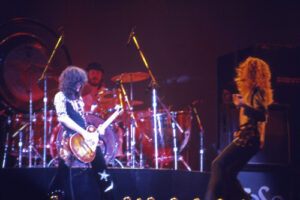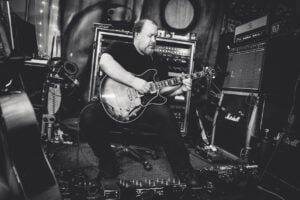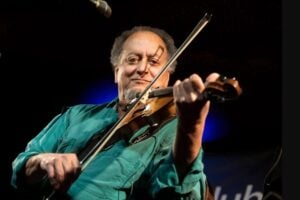
Photo: By Phil Guest from Bournemouth, UK (Standing ovation) [CC BY-SA 2.0 (https://creativecommons.org/licenses/by-sa/2.0)], via Wikimedia Commons
Like so many progressive rock bands, Focus released a steady stream of records throughout the 1970’s. The change in music at the end of the decade appeared to influence progressive rock bands. The success of bands like The Ramones, Blondie, and The Sex Pistols seemed to turn attention away from progressive rock to the sounds of punk and new wave. Many progressive rock bands broke up in the late 1970s but returned temporarily in the mid-80s or 90s. Focus released seventeen studio albums from 1970 to 2017. Interestingly, five of those albums were released in the 2000s.
# 10 – Tommy
We open up our top 10 Focus songs list with the great guitar-driven track, “Tommy.” The song was released on the band’s second album, Moving Pictures. Just when you thought that Rush originally came up with the idea for that album title. The piece “Tommy” is actually a section of the suite Eruption.
# 9 – Bennie Helder
“Bennie Helder” opens Mother Focus with a sound that feels surprisingly modern for its time, blending the warmth of 1970s instrumentation with a forward-looking sense of rhythm and tone. The song immediately catches attention with its use of wah-wah guitar, creating a fluid, almost conversational texture that sets the mood for the album. Recorded in 1975 at Olympic Sound Studios in London and produced by Mike Vernon, the track features Thijs van Leer on keyboards, flute, and vocals, Jan Akkerman on guitars, Bert Ruiter on bass, and Colin Allen on drums and percussion. The composition leans into a jazz fusion influence while still holding onto the progressive rock identity that defined the band’s earlier work. Each instrument finds space to breathe within the mix, with Akkerman’s guitar phrasing complementing van Leer’s subtle melodic touches on electric piano. “Bennie Helder” stands as both a statement of transition and a showcase of confidence, revealing a band willing to experiment with groove and atmosphere while maintaining the musicianship that had always set them apart.
# 8 – Brother
“Brother” begins with a tender and reflective piano passage that immediately sets a mood of melancholy and restraint, its phrasing reminiscent of the early ballad work of Elton John. As the piece unfolds, that gentle introduction gives way to a more expansive section that introduces a vocal performance by P. J. Proby, whose tone carries shades of Leon Russell’s soulful inflection, creating an intriguing blend of British rock and American rhythm and blues influence. Recorded in 1978 for the album Focus con Proby, the song was produced by Mike Vernon at Chipping Norton Recording Studios in Oxfordshire. The musicians include Thijs van Leer on keyboards and flute, Eef Albers on guitar, Bert Ruiter on bass, and Steve Smith on drums, with Proby taking lead vocals. The track stands as one of the most emotionally resonant moments on the album, offering a contrast to the instrumental pieces that dominate much of Focus’s catalog. Its slow piano introduction, shifting dynamics, and vocal depth illustrate how the band was willing to explore new territory late in the 1970s while maintaining the melodic sophistication that had defined their earlier work.
# 7 – Focus 10
The opening moments of “Focus 10” deliver an immediate burst of precision and grace, with Menno Gootjes’s guitar tone setting the entire piece in motion. His phrasing carries a fluidity that borders on the lyrical, with a smoothness and tonal control that recalls the style of Alan Holdsworth. Recorded in 2012 at Wedgeview Studios in Woerdense Verlaat in the Netherlands, Fieldwork Studios in Schoten in Belgium, and additional sessions at Skystudio and Bassbob Studios, the track was produced by Bobby Jacobs and Geert Scheijgrond. Thijs van Leer performs on Hammond organ, flute, and vocoder, with Bobby Jacobs on bass and Pierre van der Linden on drums. Together they create an intricate yet balanced soundscape that feels both spontaneous and deliberate. The guitar takes the lead throughout, weaving through the shifting rhythm patterns with a sense of melodic exploration that perfectly complements van Leer’s subtle keyboard accents. Featured on the album Focus X, released on November 5, 2012, “Focus 10” exemplifies how the band continues to evolve while preserving the rich interplay and musicianship that have always defined their work.
# 6 – Happy Nightmare
“Happy Nightmare” carries a haunting sense of melody that sets it apart from the rest of Focus Plays Focus, revealing the band’s early interest in fusing pop, jazz, and classical influences. Recorded in January 1970 at Sound Techniques in Chelsea, London, the track was produced by Hubert Terheggen with Jerry Boys as engineer. Thijs van Leer performs vocals, Hammond organ, piano, electric piano, Mellotron, harpsichord, vibraphone, and flute. Jan Akkerman provides the guitar work, Martijn Dresden handles both bass and lead vocals, Hans Cleuver plays drums and adds backing vocals, and Wouter Möller contributes cello. The song presents a rare vocal highlight in an album largely centered on instrumental compositions. While Focus Plays Focus did not chart internationally, it earned an Edison Award in the Netherlands, and “Happy Nightmare” was featured as part of the group’s first single release in their home country.
# 5 – Sylvia
Every note of “Sylvia” feels like a quiet revelation, an instrumental that lets melody do all the speaking. It was recorded in 1972 at Olympic Studios under the production of Mike Vernon and later appeared on Focus’s album Focus 3. The track features Thijs van Leer on Hammond organ and occasional falsetto vocalizing, Jan Akkerman on electric guitar, Bert Ruiter on bass, and Pierre van der Linden on drums. When issued as a single in the United Kingdom on January 27, 1973, it climbed to number four on the United Kingdom Singles Chart, becoming Focus’s biggest international hit. In the United States it reached number eighty-nine on the Billboard chart. Van Leer originally composed the melody years earlier with lyrics for singer Sylvia Alberts, but she rejected that version, so the song remained unused until Focus arranged it as an instrumental and renamed it after her.
The piece is praised for its elegance and restraint, with Akkerman’s guitar lines carrying a sense of clarity and power while van Leer’s organ adds warmth and atmosphere. The rhythm section holds everything steady with precision and confidence. Its success elevated Focus 3 to platinum status in several countries and secured the group’s reputation as exceptional composers who could balance technical mastery with genuine emotion.
# 4 – Hamburger Concerto
“Hamburger Concerto” unfolds like a musical journey that bridges the grandeur of classical composition with the energy of progressive rock. Recorded in January and March of 1974 at Olympic Sound Studios and Air Studios in London, the piece was produced by Mike Vernon and stands as the title track of Focus’s fourth studio album. The composition features Thijs van Leer on Hammond organ, flute, and Mellotron, Jan Akkerman on guitars, Bert Ruiter on bass, and Colin Allen on drums and percussion. Structured in six movements, it draws from the theme of Johannes Brahms’s “Variation on a Theme by Haydn” and weaves it into a multi-part suite that blends intricate instrumental passages with moments of grandeur and quiet reflection. The piece of music filled the entire second side of the album.
# 3 -Round Goes The Gossip
“Round Goes the Gossip” opens with a Latin passage drawn from Virgil’s Aeneid, setting a dramatic and intellectual tone before the song transitions into its repeating English refrain. Recorded in July 1972 at Olympic “B” Studios in Barnes, London, the track was produced by Mike Vernon and engineered by George Chkiantz. Thijs van Leer performs the Latin vocal lines and organ parts, while Jan Akkerman provides guitar, Bert Ruiter plays bass, and Pierre van der Linden handles drums. Mike Vernon contributes the layered backing vocals that reinforce the hypnotic chorus. The song stands apart on Focus 3 as the only track that features a full vocal performance, serving as a bridge between the group’s instrumental work and their more lyrical explorations. Its juxtaposition of classical language, progressive rock composition, and rhythmic intensity captures the adventurous spirit that defined Focus during this era. “Round Goes the Gossip” remains one of the most distinctive pieces in their catalog, an example of how the band fused intellectual ambition with musical precision to create something entirely their own.
# 2 – House Of The King
“House of the King” is a tightly composed instrumental recorded by Focus and released as a single in January 1971. The track was originally cut for their debut album Focus Plays Focus (later reissued internationally as In and Out of Focus) after the band captured the attention of its label with the song’s commercial appeal. The instrumentals feature Jan Akkerman on acoustic guitar during the main section and a brief electric guitar solo in the bridge, with Thijs van Leer playing flute and also contributing piano chords in the bridge. Hans Cleuver handles the drums and Martijn Dresden plays bass. Unlike the sprawling instrumentals Focus would later become known for, “House of the King” runs under two and a half minutes. It reached number 10 on the Dutch charts and was included on both In and Out of Focus and the 1972 double album Focus 3.
The piece is rooted in baroque pop style and was reportedly born out of an improvised instrumental that followed an incident in June 1970 in Majorca, where the band’s performance exceeded its allotted time, and their equipment was cut off. Its success convinced the group’s management to keep the band together during a turbulent period, and the song later became known for its use in television, serving as the theme for the 1970s ITV show Don’t Ask Me and, more recentl,y for the Steve Coogan series Saxondale
# 1 – Hocus Pocus
It’s possible you may not know the band Focus, but if you have been alive since the 60s or 70s, chances are you have heard this classic song. “Hocus Pocus” was the band’s biggest hit of their career.. “Hocus Pocus” was written by Thijs van Leer and Jan Akkerman and first recorded in 1971 for Focus’s second album Moving Waves. The recording took place between April 13 and May 14, 1971, at Sound Techniques and Morgan Studios in London, with producer Mike Vernon overseeing the sessions. The song alternates between a driving rock riff and sections of free-spirited solos by van Leer that feature yodeling, flute, organ, whistling, scat singing, and accordion, all backed by Pierre van der Linden’s precise drumming and Akkerman’s guitar.
The original album version ran six minutes and forty-two seconds, while the single version was edited for radio play. Following the band’s performance on The Old Grey Whistle Test in late 1972 and a successful British club tour, the single rose to number twenty on the United Kingdom Singles Chart. When released in the United States in 1973, paired with a faster version titled “Hocus Pocus II,” it reached number nine on the Billboard Hot 100 and number four on the Cash Box Top 100. The song’s inventive fusion of rock intensity with eccentric musicianship made it one of the most distinctive tracks of its era and a defining moment in the career of Focus.
Check out similar articles on ClassicRockHistory.com Just click on any of the links below……
Read More: Artists’ Interviews Directory At ClassicRockHistory.com
Read More: Classic Rock Bands List And Directory



































you forgot the real no 1 . BIRTH